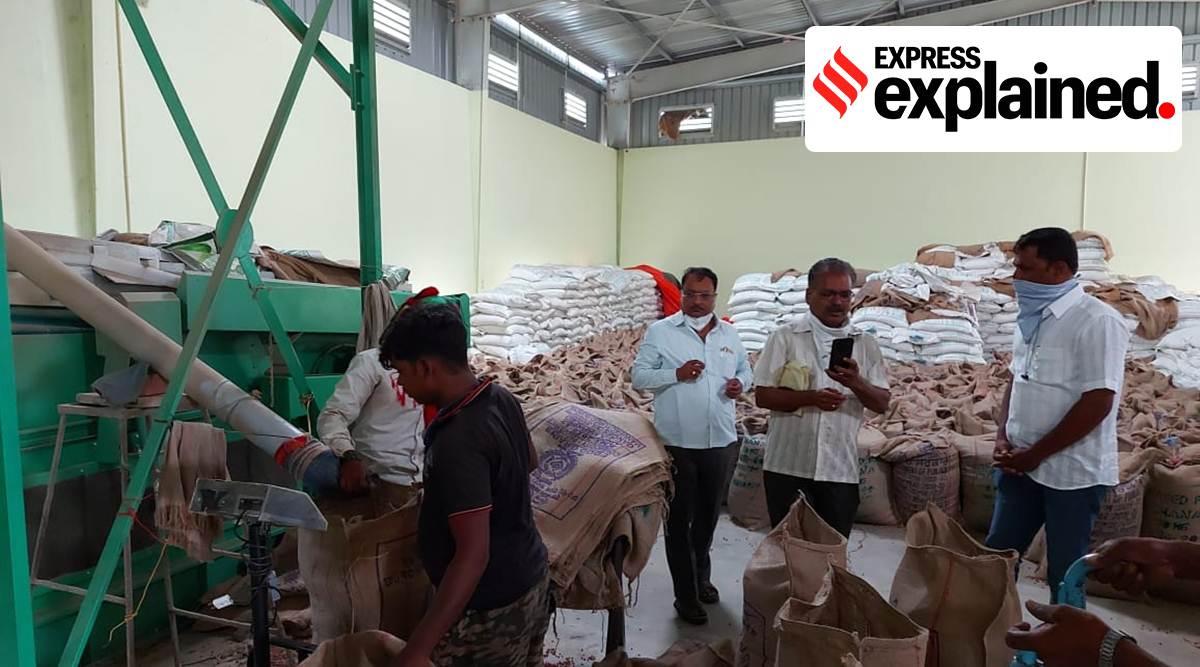Punjab Chief Minister Capt Amarinder Singh last week described as “another provocation” to agitating farmers the move by Food Corporation of India (FCI) to ask for land records in order to make direct e-payments for procurement of paddy and wheat.
The sharing of land records and making online payments directly into farmers’ bank accounts is not new — sugarcane farmers in Maharashtra accepted payments in this way even when the penetration of banks was much lower in the country. How does the system work in Maharashtra?

Newsletter | Click to get the day’s best explainers in your inbox
MSP procurement
Unlike in Punjab or Haryana, the FCI’s role in government-led procurement operations at Minimum Support Price (MSP) is minimal in Maharashtra. Given the state’s crop profile, the major players in MSP operations in Maharashtra are the National Agricultural Cooperative Marketing Federation (NAFED) and Cotton Corporation of India (CCI).
NAFED operates through sub-agencies like the Maharashtra State Cooperative Marketing Federation and Vidarbha Cooperative Marketing Federation. CCI appoints the Maharashtra State Cooperative Cotton Growers’ Marketing Federation as its sub-agent mainly for procurement in the districts of Vidarbha.
Both these central agencies wade in to procure only when the average traded prices of commodities like toor, chana, kapaas (raw unginned seed cotton), soybean, etc. in the wholesale markets fall below their government declared MSP. Active procurement stops once wholesale prices cross the MSP. For example, for the current season, NAFED had started procurement of soybean, but the operation ended as soon as mandi prices crossed the MSP.
Procurement process
Story continues below this ad
Once the target for procurement (this is generally 25 per cent of the final yield) is declared, the sub-agencies are asked to activate ground operations. In the case of NAFED, the actual procurement is done through village-level cooperative marketing unions; CCI itself buys from farmers at designated centres.
Farmers who want to sell their produce at the centres have to register using their land documents, sowing certificates issued by the village-level revenue officer, Aadhaar, PAN, and bank details. Once the registration is complete, the farmer gets an SMS giving the probable date of procurement.
The farmer is expected to bring his produce to the designated centre on the designated day. Payment is usually transferred to the farmer’s bank account within a few days.
APMCs, arhtiyas, traders
Before MahaFPC, the apex body of Farmer Producer Companies (FPCs) in the state, came into the picture in 2014, procurement for pulses and oilseeds happened in the mandis. MahaFPC took procurement to the village level, acting through member FPCs.
Story continues below this ad
In the case of CCI, the Agricultural Produce Market Committees (APMCs) certify the farmer’s credentials, and the actual delivery takes place at the designated processing units, which are mostly located near the APMCs.
In both cases, the role of APMCs is limited, and arhtiyas/traders have no involvement in the official procurement process.
Ground-level agencies like the cooperative unions or FPCs who actually carry out procurement levy a very small service charge, but APMCs do not impose any levy on government procurement. Thus, the financial stakes for mandis, arhtiyas, or traders in the process are virtually non-existent. In fact, government procurement is more the exception than the norm for the majority of the farmers in the state.
Potential for glitches
Story continues below this ad
Land records and revenue documents are critical to validate the farmer’s claim on the crop, and bank details help track the movement of funds. In the case of NAFED-led procurement, NAFED pays the sub-agents, who transfer the money to ground-level agencies who, in turn, give it to farmers in their accounts.
Procurement involves stages of registration, delivery, and payment, and takes some time. While CCI’s centres open after October for procurement of kapaas, procurement for oilseeds is often delayed — this is for reasons ranging from delays in decision-making to the absence of ground-level infrastructure to implement the procurement. There have been discussions about the need for MahaFPC to step in where the intervention of cooperative bodies has not been effective.
A few years ago, when back-to-back bumper crops of toor crashed the markets, many farmers suffered because they did not get the SMS asking them to bring their produce to the markets.
Other examples
The best example by far of another mostly online procurement system is of sugar.
Story continues below this ad
Farmers register their cane with mills well in advance, which allows the mills to draw up a programme for harvesting. Given the size of the payments involved, mills in Maharashtra have long relied on bank transfers using NEFT, RTGS, etc. modes.
Growers of cane, unlike those of other crops, are assured of a government-declared Fair and Remunerative Price (FRP), and mills have to produce records of payments before the sugar commissioner. Failure to pay can invite action against mills.








































